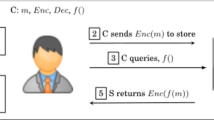Abstract
Braid cryptosystem was proposed in CRYPTO 2000 as an alternate public-key cryptosystem. The security of this system is based upon the conjugacy problem in braid groups. Since then, there have been several attempts to break the braid cryptosystem by solving the conjugacy problem in braid groups. In this article, we first survey all the major attacks on the braid cryptosystem and conclude that the attacks were successful because the current ways of random key generation almost always result in weaker instances of the conjugacy problem. We then propose several alternate ways of generating hard instances of the conjugacy problem for use braid cryptography.
Similar content being viewed by others
References
Anshel I., Anshel M. and Goldfeld D. (1999). An algebraic method for public-key cryptography. Math. Res. Lett. 6: 287–291
Birman J.S.: Braids, links and mapping class groups, Annals of Math. Study 82, Princeton University Press (1974).
Birman J.S., Gebhardt V., González-Mensese J.: Conjugacy in Garside groups I: Cyclings, Powers, and Rigidity, arXiv:math.GT/0605230
Birman J.S., Ko K.H. and Lee S.J. (2001). The infimum, supremum, and geodesic length of a braid conjugcy class. Adv. Math. 164(1): 41–56
Cha J.C., Ko K.H., Lee S.J., Han J.W., Cheon J.H.: An efficient implementation of braid groups. Advances in Cryptology: Proceedings of ASIACRYPT 2001, Lecture Notes in Computer Science, Springer-Verlag, vol 2248 pp. 144–156 Springer-verlag (2001).
Cheon J.H., Jun B.: A polynomial time algorithm for the braid Diffie-Hellman conjugacy problem. Advances in Cryptology: Proceedings of CRYPTO 2003, Lecture Notes in Computer Science, vol 2729, pp. 212–225. Springer-Verlag-2003.
Dehornoy P. (2004). Braid-based cryptography. Contemp. Math. 360: 5–33
El-Rifai E.A and Morton H.R. (1994). Algorithms for positive braids. Quart. J. Math. Oxford Ser. 45(2): 479–497
Franco N. and Gonazález-Meneses J. (2003). Conjugacy problem for braid groups and Garside groups. J. Algebra 266(1): 112–132
Garber D., Kaplan S., Teicher M., Tsaban B., Vishne U.: Length-based conjugacy search in the Braid groups. http://arXiv.org/abs/math.GR/0209267
Garside F.A. (1969). The braid group and other groups. Quart. J. Math. Oxford Ser. 20(2): 235–254
Gebhardt V.: A new approach to the conjugacy problem in Garside groups, to appear in J. Algebra, (2005).
Gebhardt V. (2006). Conjugacy search in braid groups, from a braid-based cryptography point of view, applicable algebra in engineering. commun computi. 17(3–4): 219–238
Hofheinz D., Steinwandt R.: A practical attack on some braid group based cryptographic primitives, 6th International Workshop on Practice and Theory in Public Key Cryptography: Proceedings of PKC 2003, Lecture Notes in Computer Science, vol 2567, pp. 187–198. Springer Verlag (2002).
Hughes J.: A linear algebraic attack on the AAFG1 braid group cryptosystem, ACISP 2002, Lecture Notes in Computer Science, vol 2384, pp. 176–189. Springer-Verlag (2002).
Hughes J., Tannenbaum A.: Length-based attacks for certain group based encryption rewriting systems, Workshop SECI02, Sécurité de la Communication sur Internet, Sept. 2002.
Ko K.H., Choi D.H., Cho M.S., Lee J.W.: New signature scheme using conjugacy problem, Available at: http://eprint.iacr.org/2002/168.pdf
Ko K.H., Lee J.W.: A fast algorithm to the conjugacy problem on generic braids, to appear in the proceedings of Knot theory for Scientific Objects, March, 2006, Osaka, Japan.
Ko K.H., Lee J.W.: A polynomial-time solution to the reducibility problem, arXiv:math.GT/0610746.
Ko K.H., Lee S.J., Cheon J.H., Han J.W., Kang J.S., Park C.S.: New public-key cryptosystem using braid groups. Advances in Cryptology: Proceedings of CRYPTO 2000. Lecture Notes in Computer Science, vol 1880, pp. 166–183. Springer-Verlag (2000).
Lee E. (2004). Braid groups in cryptology. IEICE Trans. Fundamentals, E 87A(5): 986–992
Lee S.J.: Algorithmic solutions to decision problems in the braid groups, PhD Thesis, Korea Advanced Institute of Science and Technology (2000).
Lee S.J., Lee E.K.: Potential weakness of the commutator key agreement protocol based on braid groups, Proceedings of EUROCRYPT 2002, Lecture Notes in Computer Science, vol 2332, pp. 14–28. Springer-Verlag (2002).
Lee E., Park J.H.: Cryptanalysis of the public-key encryption based on braid groups, Advances in Cryptology: Proceedings of EUROCRYPT 2003, Lecture Notes in Computer Science, vol 2565, pp. 477–490. Springer-Verlag (2003).
Maffre S. (2006). A weak key test for braid based cryptography. Designs Code. Cryptogr. 39(3): 347–373
Myasnikov A., Shpilrain V., Ushakov A.: A practical heuristic attack on the Ko-Lee key exchange protocol. Advances in Cryptology: Proceedings of CRYPTO 2005, Lecture Notes in Computer Science, vol 3621, pp. 86–96. Springer-Verlag (2005).
Sibert H.: Algorithmique des tresses, PhD Thesis, Universite de Caen (2003).
Sibert H., Dehornoy P. and Girault M. (2006). Entity authentication schemes using braid word reduction. Discrete Applied Math. 154(2): 420–436
Author information
Authors and Affiliations
Corresponding author
Additional information
Communicated by P. Wild.
Rights and permissions
About this article
Cite this article
Ko, K.H., Lee, J.W. & Thomas, T. Towards generating secure keys for braid cryptography. Des. Codes Cryptogr. 45, 317–333 (2007). https://doi.org/10.1007/s10623-007-9123-0
Received:
Revised:
Accepted:
Published:
Issue Date:
DOI: https://doi.org/10.1007/s10623-007-9123-0




